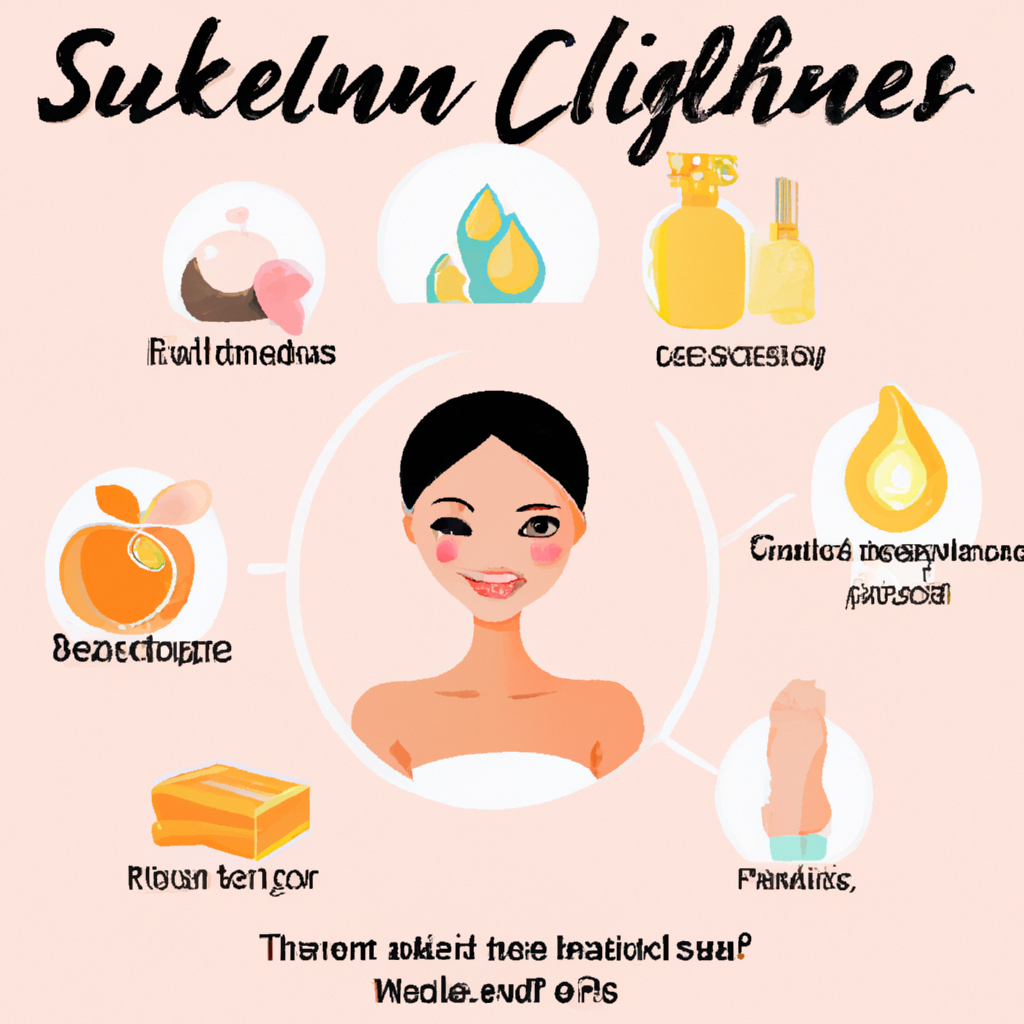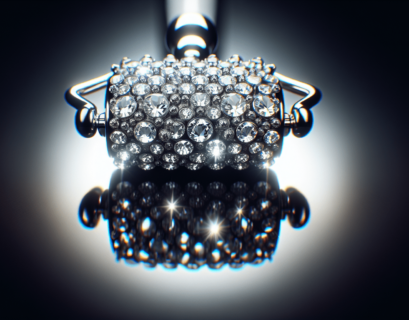Are you yearning for that radiant, glowing skin? Look no further! In this article, you will discover ten easy-to-follow skincare tips that will help you achieve the glowing complexion you’ve always dreamed of. From adopting a consistent skincare routine to nourishing your body from within, these tips cover all aspects of skincare. So get ready to pamper yourself and discover the secret to achieving that enviable radiant glow!
Understanding Skin Basics
The top layer and its role
The top layer of your skin, known as the epidermis, plays a crucial role in protecting your body from external factors such as bacteria, UV rays, and pollution. It acts as a barrier that prevents harmful substances from entering your body, while also retaining moisture to keep your skin hydrated. Understanding the importance of maintaining a healthy and intact epidermal layer is essential for achieving glowing skin.
The importance of collagen and elastin
Collagen and elastin are two proteins that are vital for the health and appearance of your skin. Collagen provides structural support and helps keep your skin firm and supple, while elastin allows your skin to stretch and bounce back to its original shape. As you age, the production of collagen and elastin slows down, leading to the formation of wrinkles, fine lines, and sagging skin. To maintain glowing skin, it’s important to stimulate collagen and elastin production through proper skincare habits and a healthy lifestyle.
Different types of skin and their characteristics
Skin types can vary greatly from person to person, and understanding your specific skin type is crucial for creating an effective skincare routine. The most common skin types are oily, dry, combination, and sensitive. Oily skin tends to produce excess sebum, leading to a shiny appearance and frequent breakouts. Dry skin lacks moisture and can feel tight and flaky. Combination skin is a mix of oily and dry areas, while sensitive skin is prone to irritation and redness. Knowing your skin type will help you choose the right products and treatments to achieve glowing skin.
Role of Diet in Skincare
Importance of hydration for skin
Hydrating your skin from within is vital for maintaining its health and glow. Drinking an adequate amount of water helps flush out toxins from your body, keeping your skin clear and radiant. Water also plays a key role in maintaining the elasticity and plumpness of your skin. Apart from water, incorporating hydrating foods such as fruits and vegetables into your diet can further enhance your skin’s moisture levels.
Nutrients essential for healthy skin
A well-balanced diet rich in essential nutrients is essential for nourishing your skin from the inside out. Some key nutrients for healthy skin include vitamins A, C, and E, which help protect your skin from damage caused by free radicals. Omega-3 fatty acids are also important for maintaining a healthy skin barrier and reducing inflammation. Incorporating foods like carrots, oranges, almonds, and fatty fish into your diet can provide these essential nutrients and promote glowing skin.
Foods to include and avoid for glowing skin
In addition to hydrating foods and essential nutrients, there are certain foods that you should include in your diet for optimal skin health. Antioxidant-rich foods like berries, leafy greens, and dark chocolate help protect your skin from oxidative stress and promote a youthful, glowing complexion. On the other hand, it’s important to avoid excessive consumption of sugary and processed foods, as they can contribute to inflammation and skin issues. Maintaining a balanced diet and including a variety of nutritious foods will go a long way in achieving and maintaining glowing skin.
The Impact of Lifestyle on Skin Health
Effect of stress on skin
Stress can have a significant impact on your skin’s health and appearance. When you’re under stress, your body releases cortisol, a hormone that can trigger inflammation and increase oil production. This can lead to breakouts, dullness, and accelerated aging. Managing stress through relaxation techniques, exercise, and self-care practices can help maintain the health and glow of your skin.
How smoking and alcohol affect skin health
Smoking and excessive alcohol consumption can have detrimental effects on your skin. Smoking restricts blood flow to the skin, depriving it of essential nutrients and oxygen, leading to premature aging, wrinkles, and a dull complexion. Alcohol, on the other hand, dehydrates the skin and can cause inflammation, redness, and puffiness. Quitting smoking and moderating alcohol consumption are vital steps towards achieving and maintaining glowing skin.
Role of exercise in skin glow
Regular exercise not only benefits your overall health but also has positive effects on your skin. When you exercise, blood circulation increases, delivering oxygen and essential nutrients to your skin cells, resulting in a healthy glow. Sweating during exercise also helps flush out toxins and impurities from your pores, promoting clearer skin. Incorporating a mix of cardiovascular and strength training exercises into your routine can contribute to vibrant and glowing skin.
Importance of Regular Cleansing
Choosing the right cleanser for your skin
Choosing the right cleanser for your skin type is crucial for maintaining its health and glow. Oily skin types may benefit from cleansers with salicylic acid or tea tree oil to control excess oil production and prevent breakouts. Dry skin types, on the other hand, should opt for gentle, hydrating cleansers that do not strip away natural oils. Combination skin can benefit from mild cleansers that balance oil production and moisturize simultaneously. Sensitive skin types should look for fragrance-free and hypoallergenic cleansers to avoid irritation.
Proper method of cleansing
To effectively cleanse your skin, start by wetting your face with lukewarm water to open up your pores. Apply a small amount of cleanser onto your fingertips and massage it gently onto your face in circular motions. Pay extra attention to areas prone to oiliness or makeup residue. Rinse off the cleanser thoroughly with warm water, making sure no residue is left behind. Finish by patting your face dry with a clean towel.
Frequency of cleansing
The frequency of cleansing your skin depends on your skin type and lifestyle factors. Generally, it is recommended to cleanse your face twice a day, once in the morning and once at night, to remove impurities and maintain a clean canvas for skincare products. However, if you have oily or acne-prone skin, you may benefit from cleansing more frequently to prevent clogged pores. On the other hand, individuals with dry or sensitive skin may find that cleansing once a day is sufficient.
Exfoliation for Brighter Skin
Understanding the process of exfoliation
Exfoliation is the process of removing dead skin cells from the surface of your skin to reveal a brighter and smoother complexion. As we age, our skin’s natural exfoliation process slows down, leading to a buildup of dead skin cells that can make the skin appear dull and rough. Exfoliation helps speed up cell turnover and promotes the growth of new, healthy skin cells, resulting in a more youthful and radiant appearance.
Choosing the right exfoliator
There are two main types of exfoliators: physical exfoliators and chemical exfoliators. Physical exfoliators typically use granules or particles to physically scrub away dead skin cells. These can include ingredients like sugar, salt, or crushed fruit seeds. Chemical exfoliators, on the other hand, use acids or enzymes to dissolve the bonds between dead skin cells, allowing them to be gently sloughed off. When choosing an exfoliator, consider your skin type and sensitivity. Physical exfoliators may be too harsh for sensitive or acne-prone skin, while chemical exfoliators may be too strong for dry or fragile skin.
Right method and frequency of exfoliation
To exfoliate your skin, start by wetting your face with warm water. Take a small amount of the exfoliator and gently massage it onto your skin using circular motions. Avoid applying too much pressure, as this may cause irritation. Rinse off the exfoliator thoroughly with warm water, making sure to remove all residue. Exfoliating your skin 1-2 times a week is generally sufficient to maintain a healthy glow. However, individuals with oily or acne-prone skin may benefit from more frequent exfoliation, whereas those with dry or sensitive skin should exfoliate less frequently to avoid irritation.
Significance of Moisturizing
Why moisturizer is important for all skin types
Moisturizing is a crucial step in any skincare routine, regardless of your skin type. Even oily skin needs hydration to maintain its balance and prevent excess oil production. Moisturizers help replenish and lock in moisture, preventing moisture loss and keeping your skin hydrated. They also serve as a protective barrier against environmental aggressors, helping to maintain your skin’s health and glow.
How to choose the right moisturizer
Choosing the right moisturizer for your skin depends on factors such as your skin type, concerns, and preferences. For oily skin, opt for lightweight, oil-free moisturizers that won’t clog your pores. Dry skin types can benefit from rich, emollient moisturizers that provide intense hydration. Combination skin may require a moisturizer that balances oil and moisture levels. Sensitive skin types should look for fragrance-free and hypoallergenic moisturizers to minimize the risk of irritation.
Tips for applying moisturizer effectively
To ensure optimal moisturization, apply your moisturizer onto clean, damp skin. This helps lock in moisture and improves absorption. Start by taking a small amount of moisturizer and gently massage it onto your face and neck using upward motions. Pay attention to any dry or dehydrated areas. Allow the moisturizer to fully absorb before proceeding with sunscreen or makeup application. Remember to moisturize both in the morning and at night for round-the-clock hydration.
Sun Protection Measures
Damages caused by sun exposure
Sun exposure is one of the leading causes of premature aging and skin damage. UV rays from the sun can penetrate your skin, causing DNA damage, collagen breakdown, and the formation of free radicals. This can lead to wrinkles, sunspots, and an increased risk of skin cancer. Protecting your skin from the sun is crucial for maintaining its health, youthfulness, and glow.
Choosing the right sunscreen
When it comes to sun protection, choosing the right sunscreen is essential. Look for a broad-spectrum sunscreen that protects against both UVA and UVB rays. SPF, or Sun Protection Factor, indicates the level of protection against UVB rays. Opt for a sunscreen with an SPF of 30 or higher for daily use. Consider your skin type and preferences when selecting a sunscreen formula, whether it be a lotion, gel, or spray. Apply a generous amount of sunscreen to all exposed areas of your body and reapply every two hours, or more frequently if sweating or swimming.
Additional steps for sun protection
In addition to sunscreen, there are other steps you can take to protect your skin from the sun. Seek shade during the peak hours of 10 am to 4 pm when the sun’s rays are the strongest. Wear protective clothing such as wide-brimmed hats, sunglasses, and long-sleeved shirts to further shield your skin from UV rays. Remember to apply sunscreen to often neglected areas like your ears, neck, and hands. Taking these extra precautions will help maintain the health and radiance of your skin.
Role of Sleep in Skincare
How lack of sleep affects the skin
Lack of sleep can have a significant impact on the health and appearance of your skin. When you don’t get enough sleep, your body produces more stress hormones, which can lead to inflammation and break down collagen and elastin. This results in a loss of firmness, appearance of dark circles, and a dull complexion. Lack of sleep can also impair the skin’s natural ability to repair and regenerate, making it more prone to visible signs of aging.
Sleep-friendly skincare routine
Establishing a sleep-friendly skincare routine can help improve the quality of your sleep and promote healthy skin. Start by cleansing your face to remove any dirt, makeup, or pollutants that may have accumulated throughout the day. Follow with a nighttime moisturizer that nourishes your skin and locks in moisture while you sleep. Consider incorporating a hydrating overnight mask or facial oil for added hydration. Finally, create a relaxing atmosphere in your bedroom by using calming scents, dimming the lights, and practicing meditation or deep breathing exercises before bed.
Tips for a restful sleep
In addition to a skincare routine, there are several other tips you can follow to improve the quality of your sleep. Establish a regular sleep schedule by going to bed and waking up at consistent times, even on weekends. Create a soothing sleep environment by keeping your bedroom cool, dark, and free from electronic devices. Avoid stimulating activities or caffeine close to bedtime, and instead, engage in relaxing activities like reading or taking a warm bath. By prioritizing sleep and adopting a sleep-friendly routine, you can support your skin’s health and achieve a glowing complexion.
DIY Home Remedies for Glowing Skin
Natural ingredients which promote skin glow
Nature offers a multitude of ingredients that can promote glowing skin. Some natural ingredients known for their skin-brightening properties include lemon juice, honey, turmeric, aloe vera, and green tea. Lemon juice contains citric acid, which can help remove dead skin cells and lighten dark spots. Honey has moisturizing and antimicrobial properties that can enhance the overall complexion. Turmeric acts as an anti-inflammatory and can reduce redness and improve the skin’s radiance. Aloe vera soothes and hydrates the skin, while green tea provides antioxidants that protect and revitalize the skin.
Recipes of homemade face packs
Homemade face packs can be a fun and cost-effective way to achieve glowing skin. One popular recipe is a honey and lemon face pack. Mix one tablespoon of honey with a few drops of freshly squeezed lemon juice and apply it to your face. Leave it on for 15-20 minutes before rinsing off with warm water. Another effective face pack is a turmeric and yogurt mask. Mix one teaspoon of turmeric powder with two tablespoons of plain yogurt and apply it to your face. Let it sit for 10-15 minutes, then rinse off with lukewarm water. Experimenting with different natural ingredients can help you find the perfect homemade face pack for your skin’s needs.
Precautions while using home remedies
While home remedies can be beneficial for your skin, it’s important to exercise caution and follow certain precautions. Always patch test any new ingredient or product on a small area of your skin before applying it all over your face to check for any allergic reactions or sensitivities. Avoid using ingredients that may irritate your skin, such as citrus fruits or abrasive substances, if you have sensitive or acne-prone skin. It’s also essential to maintain proper hygiene while preparing and applying home remedies to minimize the risk of contamination. Lastly, remember that results may vary, and consistency is key when using home remedies for glowing skin.
Professional Care for Skin Glow
When to seek professional help
While daily skincare habits are essential, there are times when professional help is necessary to achieve glowing skin. If you have persistent skin concerns such as severe acne, rosacea, or hyperpigmentation, it’s advisable to consult a dermatologist. They can provide personalized recommendations, prescribe medication if needed, and perform treatments that go beyond what can be achieved with at-home skincare. If you’re unsure about your skincare routine or need guidance in selecting the right products for your skin type, a skincare professional such as an esthetician or beauty consultant can provide expertise and recommendations.
Benefits of facials and skin treatments
Facials and other professional skin treatments can provide a boost to your skincare routine and enhance the health and glow of your skin. Facials typically involve a deep cleanse, exfoliation, extraction of impurities, and application of specialized masks and serums. These treatments can help remove dead skin cells, unclog pores, improve circulation, and promote cellular renewal. Other popular treatments such as chemical peels, microdermabrasion, and laser therapy can target specific concerns and address deeper skin issues, resulting in a rejuvenated and radiant complexion.
Finding the right skincare professional
When seeking professional skincare services, it’s important to find a qualified and reputable skincare professional. Research and read reviews to ensure they have the necessary certifications and experience. Consider scheduling a consultation to discuss your skincare concerns and goals before committing to any treatments. This will allow you to assess their expertise, ask questions, and determine if they are the right fit for your individual needs. Investing in professional care can be an effective way to achieve and maintain glowing skin while receiving expert guidance and personalized treatments.
By understanding skin basics, recognizing the role of diet and lifestyle, practicing regular cleansing, exfoliation, and moisturization, protecting against sun damage, prioritizing sleep, exploring home remedies, and seeking professional care when needed, you can make substantial progress towards achieving and maintaining glowing skin. Incorporating these comprehensive skincare tips into your routine will not only promote a healthy and radiant complexion but also boost your overall confidence and well-being. Remember, taking care of your skin is a long-term commitment that requires consistency and patience, but the results are undoubtedly worth it.







